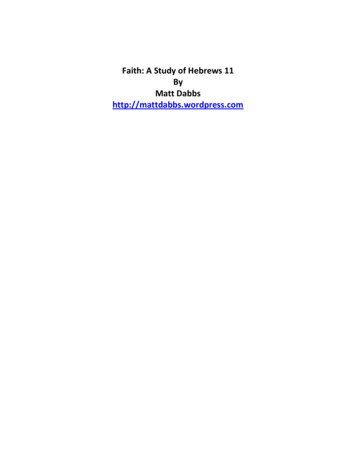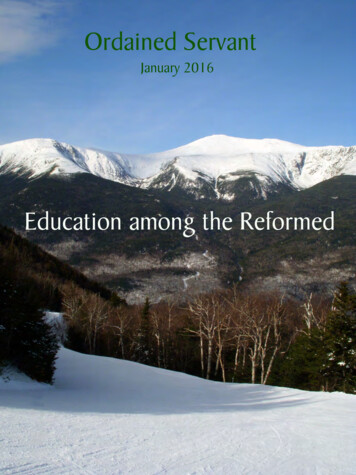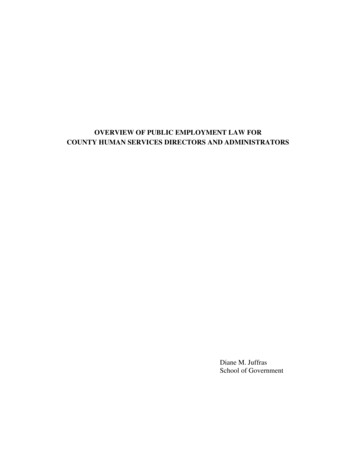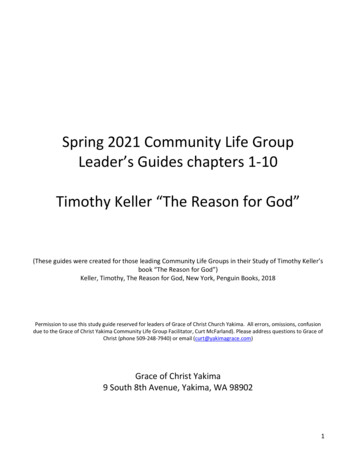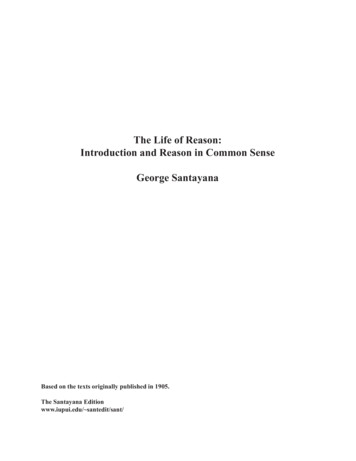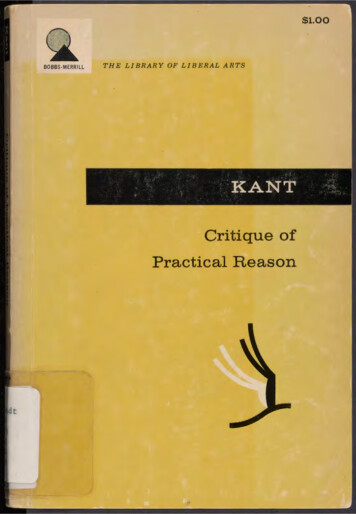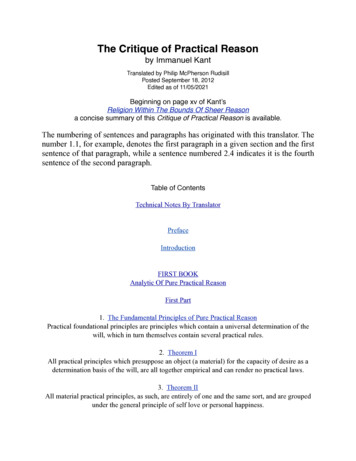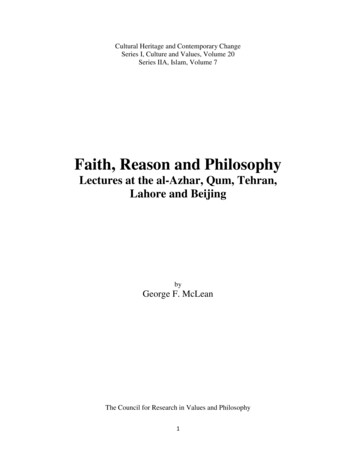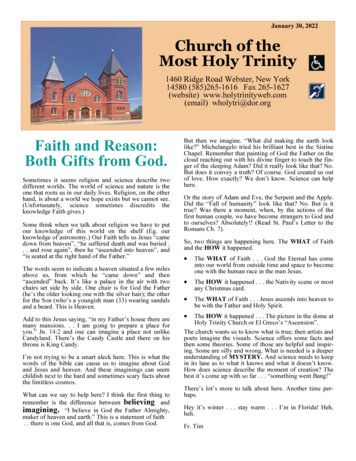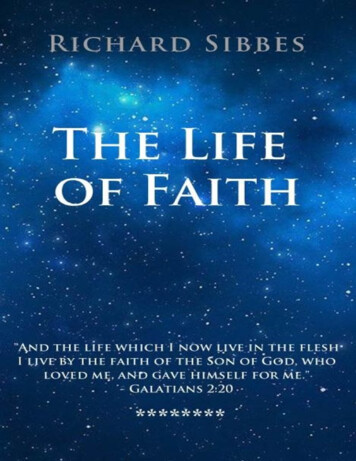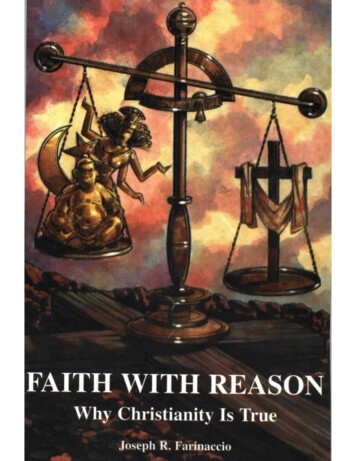
Transcription
FAITHWITHREASONWhy Christianity Is TrueJoseph R. FarinaccioBookSpecs PublishingPennsville, New Jerseyi
FAITH WITH REASONWhy Christianity Is TrueCopyright 2002Joseph R. FarinaccioCover design by artist George Perez.BookSpecs is trademark of BookSpecs Publishing, and is registered inthe U.S. Patent and Trademark Office.All rights reserved. No part of this book or its cover design may bereproduced, stored in a retrieval system, or transmitted in any form orby any means, electronic, mechanical, photocopying, recording, orotherwise, without written permission of the publisher and copyrightowners.Published by BookSpecs Publishing16 Sunset Ave.Pennsville, NJ 08070www.BookSpecs.comPublisher’s Cataloging-in-Publication Data(Provided by Quality Books, Inc.)Farinaccio, Joseph R.Faith with reason : why Christianity is true / JosephR. Farinaccio. -- 1st ed.p. cm.LCCN 2002092455ISBN 0-9721461-1-31. Apologetics. 2. Christianity and other religions.3. Christianity and culture. 4. Philosophy andreligion. I. Title.BT1102.F37 2002239QBI33-569ii
This book is dedicatedto my mother,Anne Dorothy Farinaccio,and my wife,Joni Lynn Farinaccio,- constant encouragers.iii
iv
AcknowledgementsThere are individuals whose contributions, both large andsmall, help turn someone’s idea into a reality. This book is noexception. Each of them contributed something special, not the leastof which was their time. My parents, Joseph and Anne Farinaccio, aretreasured gifts from God. Christian Education director Rev. DavidHutchinson offered a theological critique. English instructor VincentFarinaccio provided editorial skills. Fellow church member LindaSmookler made numerous manuscript corrections and offeredinsightful suggestions. Longtime friend George Perez created thebook cover. My brother Paul Farinaccio furnished a logo. Pastor andtheologian Charles Betters offered his endorsement. And my family Joni, Matthew and Nicole all patiently allowed me to spend manyhours in front of the computer. I can never say “Thank You” enoughto all of you.Joseph FarinaccioVineland, New JerseyJune 2002v
vi
CONTENTSIntroduction . 91. Can All Views Be True?. 112. Presuppositions and Worldviews . 173. Faith and Reason . 234. Christian Presuppositions. 295. Pseudo-Christianity. 376. Knowing Biblical Christianity Is True . 477. Do Christians Reason In A Circle? . 578. God and Evil . 639. Atheism and Agnosticism. 6910. Creation or Evolution?. 7711. Thoughts on World Religion . 87Conclusion. 98Endnotes .102vii
viii
INTRODUCTIONThis is a book about worldviews. Everybody hasone, but most individuals never really pay much attention totheir own personal philosophy of life. This is a tragedybecause there is no state of awareness so fundamental toliving life. Since there are many worldviews out there thisbook was written to help individuals understand why biblicalChristianity is so important, not only in our understanding ofGod, but ourselves and the world around us as well.Every subject we think about is filtered through ourworldview. The picture of reality we hold in our minds iswhat we use at the most basic level to answer every questionin life. This is especially true of big questions, like thosepertaining to man’s origin, ethics, life’s meaning and ultimatedestiny. This makes faith central to every aspect of our livesand being. The bigger question, of course, is whether or notthe picture of reality we have is actually true.Several 20th century Christian philosophers were veryinfluential in bringing attention to the subject of worldviews.Cornelius Van Til, Greg Bahnsen, and Francis Schaeffer areconsiderable influences upon the thinking of manyChristians, including myself. Most of what is contained inthese pages is simply a re-statement of fundamental truthsthey addressed. Yet there were several reasons why I wantedto offer a collection of thoughts based upon theirphilosophical work.First, this book attempts to quickly get to the heartof the matter. Presuppositions are the heart of everyone’sview of reality. I wanted to offer people, especially youngadults, a concise summary of some very important concepts.A few hours spent reading the material here will sharpen thethinking of believers and challenge those who think that9
INTRODUCTION“science” or “reason” actually serves as the foundation fortrue knowledge.Next, I wanted to focus on some of the fundamentaltopics that repeatedly come up in conversations betweenChristians and non-Christians. For this reason each chapteris really an individual essay that focuses on a particularsubject.Finally, I wanted to present the philosophy ofChristianity in relatively simple language and style. This bookis geared for a popular audience. Most people are notprofessional philosophers and do not care to be. But almostany mature person can and should recognize that they areconstantly being confronted with truth-claims from variousworldviews. Everyone has a faith and the world needs toknow what sets apart the Bible’s truth-claims from others.Many people only pretend to seek truth in order tojustify their preconceived notions of reality. Others aregenuinely searching for what is often called ultimate truth. Iwanted to share with such individuals that it is possible toknow that God does not just offer real answers to ourquestions, He’s the one who created us to ask meaningfulquestions in the first place.10
1Can All Views Be True?Is it possible for Christians to claim that their beliefsystem is true? Is the very claim itself an example ofreligious intolerance? Most public discussion of religion incontemporary culture is overshadowed by the notion thatanyone may hold religious views as long as they do not sayothers are inferior.All belief systems make truth-claims. Truth-claimsby their very nature imply that contrary assertions are false.It is impossible for two genuinely opposite truth-claims to besimultaneously true. Although the law of contradiction maynot be popular when applied to religious beliefs, it is stillundeniable “that two antithetical propositions cannot bothbe true at the same time and in the same sense. X cannot benon-X. A thing cannot be and not be simultaneously. Andnothing that is true can be self-contradictory or inconsistentwith any other truth. All logic depends on this simpleprinciple. Rational thought and meaningful discoursedemand it.”1This runs counter to the relativistic thinking that isso popular with many in our culture today. Large numbersof people tend to think that all belief systems, especially“religious” ones, must be viewed as equal.In the worldview of religious diversity, allreligions are equal even if they’recontradictory. No one religion is any moretrue than any other religion. While this11
makes for happy harmony on paper, in thereal world it just doesn’t work.Tryasserting diversity in the following areas: “It just doesn’t matter whatyou believe about mathematics, as longas you’re sincere in your beliefs.” “It doesn’t matter what youbelieve about electromagnetism, as longas you’re sincere in your beliefs.” “It doesn’t matter what youbelieve about Nazism, as long as you’resincere in your beliefs.” “It doesn’t matter what youbelieve about slavery, as long as you’resincere in your beliefs.”Few people would tolerate such nonsense,but many are very comfortable with thenotion that all religions are valid even whenthey are contradictory.2All beliefs are not equal. The theory of Evolutionand biblical Creationism may be studied as two separateviews about origins, but both of them cannot be true. It isirrational to declare the equality of all truth-claims, especiallythose made by rival religions.The history of religion is filled with countlessmovements involving believers who either desired to correctolder views or establish new ones. Tension betweendiffering religious ideas has existed all throughout humanhistory. But the need to exercise true tolerance towardsothers’ beliefs does not mean that one has to champion theirrational idea that all views are equally true. Christianity, likeall belief systems, is exclusive in the sense that it asserts its12
CAN ALL VIEWS BE TRUE?claims are true.There is nothing wrong with believing that somethings are true and others false. "Although many accuseabsolutists of intolerance, these accusers most likely have anunclear and distorted notion of what tolerance really is.They are often unaware that the concept of tolerance impliesa close relationship to truth. Contrary to popular definitions,true tolerance means ‘putting up with error’ - not ‘beingaccepting of all views’ It is because real differences existbetween people that tolerance becomes necessary andvirtuous."3 Christianity’s adherents include both convertedJews and Gentiles. The Christian faith crosses racial, ethnic,social, lingual, and national boundaries. It includes all peoplegroups, from every nation, tribe, kindred, and tongue. (Rev7:9) Its membership is inclusive and diverse, but its belief systemis exclusive and dogmatic.Biblical Christianity rejects the falsehood that allbeliefs are equal. As a belief system it claims to present truthabout God, man, and the world. While the Bible directsChristians to be sensitive towards others’ feelings itnonetheless admonishes those same believers to “Go into allthe world and preach the good news to all creation.Whoever believes and is baptized will be saved, but whoeverdoes not believe will be condemned.” (Mark 16:15-16)To reject this Christian view, or any other worldview,means that one prefers another view of reality. Worldviews areultimate. They govern our entire outlook on life. We makejudgements about everything, especially other views, withour current worldview. Those who challenge the integrity ofthe Bible as God’s Word do so because they have adoptedanother worldview. No one may legitimately say, "I don'tknow what view is right, but I know that you’re wrong." Thereason why anyone thinks another view is wrong is becausethey believe their view (whatever it may be) is correct.It is not possible, of course, for any human being toprovide an exhaustive explanation of the nature of reality. But13
the fact that we cannot know everything about reality shouldnot be used as an excuse to believe anything we want to. Itis only rational to assume that the metaphysical beliefsposited by any given belief system should not conflict witheach another.And those same beliefs should alsocollectively reveal a metaphysical framework that cangenuinely account for reality, including man’s origin andplace within it.No worldview provides comprehensive answers. Itis impossible to have every single one of our questionsexhaustively answered. Yet skeptics often single outChristianity for failing to answer every conceivable questionthey may have about God or the Bible. Why demandsomething from Christianity without requiring the samefrom their worldview? Yet such double standards arecommon among Christianity’s critics.Comprehensiveanswers are not possible for creatures with finite minds.There are many things that will remain a mystery to us in thislife. (1Cor 13:12) But lack of comprehensive informationdoes not mean one cannot have confidence in the Bible’struth-claims.The main question each of us need to ask ourselvesis this, “Why do I think my current belief system is true?”Rejecting one view in favor of another should beaccompanied by more than just a superficial nod at the bigquestions of life, and intellectual honesty demands morethan casually ignoring the truth-claims of orthodoxChristianity without really investigating them.All of us to some degree harbor certain biases forbelieving what we do. Christians certainly want the Bible tobe authentic in its revelation of God, but that is not a validreason for believing its truth-claims. Christian believers,however, are not the only ones with biases. There are those,for example, who self-consciously construct their worldviewso that it does not include God:14
CAN ALL VIEWS BE TRUE?In speaking of the fear of religion, I don’tmean to refer to the entirely ns in virtue of their objectionablemoral doctrines, social policies, and politicalinfluence.Nor am I referring to theassociation of many religious beliefs withsuperstition and the acceptance of evidentempirical falsehoods. I am talking aboutsomething much deeper – namely, the fearof religion itself . I want atheism to be trueand am made uneasy by the fact that someof the most intelligent and well-informedpeople I know are religious believers. Itisn’t just that I don’t believe in God andnaturally, hope there is no God! I don’twant there to be a God; I don’t want theuniverse to be like that.4This professing atheist recognized that worldviewshave implications. Beliefs shape the way we look at theworld and determine how we will interpret the particularfacts of the world all around us. This is no small issue. “Tocommit one’s life, habits, thoughts, goals, priorities –everything – to a certain world-view with no questions askedis, from the antagonist’s point of view, to build one’s lifeupon a very questionable foundation.”5 This makes it all themore necessary to seriously consider what is implied byultimate truth-claims. All of the world’s religions andphilosophies hold certain views regarding “God, man, andthe Cosmos.”6The world contains many differingconceptions of reality.7It is the evangelical Christian’s contention that “antiChristianity in all its forms is arbitrary. We see it to be heldtogether by will power, energy of assertion, and the turning15
of a blind eye to awkward facts rather than by force ofevidence or cogency of argument.”8 These are seriouscharges. But the apologists for any belief system mustattempt to show why their view is truer than other ones.This is a part of the journey of discovering faith with reason.16
2Presuppositions and WorldviewsEachof us is an individual creature in a vastuniverse. We are finite beings with limits to our knowledge.We cannot and do not know everything there is to know.This means that in order to reason about anything at all wemust first assume certain things about reality.At the heart of every philosophy of life are certainbasic assumptions about what is real and true. Everyone hasthese assumptions or presuppositions about what theyperceive reality to be. Day to day thinking involves the useof premises from which we draw conclusions. But thesepremises are themselves based upon certain assumptions aboutreality. When baking a loaf of leavened bread, for example,experienced bakers know that proper ingredients in rightproportions, along with a consistent yeast temperature, areall required. But their premises are based on a very generalassumption that the bread-making process requires the sameingredients and procedures today as in the past. It isassumed that the present will be like the past. Bakers, in thiscase, are presupposing that nature is uniform.The assumption that nature is uniform is a primaryassumption we use everyday. In fact, it is a prerequisite forscientific methodology. But this assumption is not proven byscience. Scientists assume that uniformity in nature is true sothat experiments can be performed. The fact that scientistsobserve uniformity within their limited experiences does notprove its universality nor does it guarantee that uniformity willstill hold true tomorrow.17
FAITH WITH REASONScience operates upon a belief in the uniformity ofnature even though it does not account for it.Presuppositions of science, logic or morality are not naturalobjects of the universe. They are merely held by individualsto be true. They are presupposed. They are assumed - byfaith.In order to reason about any subject each of us mustpresuppose the existence of certain pre-conditions in order toform the premises from which we’ll draw our conclusions.Since presuppositions lie at the heart of our beliefs aboutreality they should be identified. Yet how many of us everstop to think about what they are? Have we ever consideredthe role they play in ultimately shaping our worldview ortheir influence upon how we think and reason?The following presuppositions are assumed invarious belief systems: A personal God has revealed Himself to man asrecorded in the Bible (Christianity)There is no personal deity (Atheism)Universal economic laws are the driving forcebehind history (Marxism)Rational thought is the best way to arrive atultimate truth (Rationalism)The universe is essentially made up of matter andenergy (Materialism)The material world is not real, it’s only an illusion(Hinduism)Freedom is a human property each of uspossesses that must be exercised throughindividual choices for which each person alone isresponsible (Existentialism)18
PRESUPPOSITIONS AND WORLDVIEWSPresuppositions are at the heart of worldviews.What exactly is a worldview? The English word for worldviewcomes from “the German weltanschaaung. It literally means alife perspective or way of seeing. It is simply the way welook at the world. You have a worldview. I have aworldview. Everyone does. It is our perspective. It is ourframe of reference. It is the means by which we interpretthe situations and circumstances around us. It is whatenables us to integrate all the different aspects of our faith,and life, and experience. A worldview is simply a way ofviewing the world."9 Our worldview is our life view whereinwe try to integrate the sum and substance of life together in away that makes sense to us. It represents our personalmetaphysical outlook on life.Our most basic assumptions or presuppositionsabout reality collectively form the foundation of ourworldview. Presuppositions are interconnected. They worktogether to form a web of basic beliefs.Thesepresuppositions shape our worldview grid. This becomesthe screen through which we interpret our whole universe.The beliefs which people hold are alwaysconnected to other beliefs by relationspertaining to linguistic meaning, logicalorder, evidential dependence, causalexplanation, indexical and self conceptions,etc. To assert “ I see a ladybug on the rose”is to affirm and assume a number of thingssimultaneously-some rather obvious (e.g.,about the usage of English words, one’spersonal identity, a perceptual event,categories of bugs and flowers, physicalrelations), others more subtle (e.g., aboutone’s linguistic, entomological, andbotanical competence, the normalcy of19
FAITH WITH REASONone’s eyes and brain-stem, theories of lightrefraction, shared grammar and semantics,the reality of the external world, laws oflogic, etc.).10Since presuppositions, such as the uniformity ofnature, are simply taken for granted our worldview isultimately a faith-view. Every view of life, expressly religiousor supposedly non-religious, is a belief system that beginswith assumptions held by faith. Even worldviews that arenot officially based upon a canon of scripture, a declaredcreed, or some other formal religious system are filled withfaith nonetheless.The essence of every worldview is rooted in itstranscendent, metaphysical, governing assumptions aboutthe nature of reality. It is never really a question of which ofus exercises faith and which one doesn’t. Faith is somethingwithin all of us. “All men presuppose, whatever the namethey use for it, a synoptic view of reality as a whole. Wecontinue to call it metaphysics.”11Many people seek to construct their own worldviewthemselves. They try to come up with answers aboutultimate reality on their own when they do this. They areessentially saying, “I think that reality consists of such andsuch etc.” But those who adhere to a biblical worldviewdo not rely upon their own arbitrary assumptions as a tool toconstruct their own explanations for what exists. They beginby assuming what the Bible reveals about reality is true.Christians and non-Christians begin thinking aboutevery subject from their own worldview perspective. Theyhave different worldviews. Worldviews play a central role indiscussions about God, man and the cosmos. They touchthe very core of what we believe about reality. It should notbe surprising then that worldview clashes occur. Every one20
PRESUPPOSITIONS AND WORLDVIEWSof us will disagree with worldviews that are different fromour own.Christians regard the Bible as ultimate authoritywithin their worldview because it is assumed to be the trueWord of God. Those who wish to adhere to a biblicalworldview consciously attempt to think about every area oflife from a biblical perspective. Every biblical truth is takenas a Christian presupposition that will be held in faith as partof their whole biblical outlook on life. Bible-believingChristians assume that God has spoken with authority andalso presuppose, in accordance with scripture, that what Godhas revealed in the Bible is true.The bottom line is that everyone reasons through aview of reality that is rooted in faith-based assumptionsabout the reality they perceive to be true. Everyone has afaith-based worldview which means there are no neutralareas of life. Every aspect of being and activity is interpretedthrough our worldview grid.21
FAITH WITH REASON22
3Faith and ReasonBoth secularism12and relativism13 heavily influenceWestern society.Secularism is currently applied ingovernment, academia, and public education. Its familiarmantra is “separation of church and state.” While its goalsupposedly is to promote religious “neutrality” in statefunded institutions it is clearly anti-religious. The so-called“separation” principal is almost always used to keep religiousbeliefs from influencing any arena that receives “public”monies. Religion is only encouraged to take place within apersonal-private sphere. The result is that many publicinstitutions limit religious activity in an effort to keep it outof the public square.Why is Secularism so opposed to religion? Manysecularists argue that all types of religious dogmatism(especially the kind contained in creeds and professions offaith) should be restricted in the interest of keeping people’spersonal religious beliefs from negatively affecting otherswho have different beliefs. This means public institutionsmust attempt to be religiously neutral. The perception thatfaith-beliefs should no longer be permitted to influencepublic institutions or policy in the interest of fairness toeveryone is now widely regarded as a prerequisite for civilliberty.Behind this secularist view of religion often lies aconviction that faith-views are really beyond empiricalverification or rational proof. Secular intellectuals frequentlytreat contemporary religious belief as little more than23
FAITH WITH REASONsuperstition. Many advocates of secularism contend that itwas not God who created man but rather man who hascreated the idea of God. In their view civilization canadvance only as it moves beyond such ancient religious“myths” in favor of enlightened reason and modern science.True knowledge, they contend, is found through rational orempirical means.Western popular culture promotes relativism.Relativism’s major premise is that no absolute truth existsexcept that there is no absolute truth. The attempt todiscard a belief in absolute truth then leads people to affirmthat everyone is entitled to hold certain personal beliefs noone else has the right to question or judge. Supposedlyreligious beliefs cannot be tested for truth and thereforeeveryone’s beliefs must be regarded as equal. Everyone isentitled to religious beliefs free from rational scrutiny andmay choose whatever faith-views they want to.Both secularism and relativism have come aboutlargely as a result of a misunderstanding of the faith-reasonrelationship. Faith and reason are usually defined in such away as to mean that religious ideas have no connection withlogic.The Internet Encyclopedia of Philosophy explains therelationship between faith and reason in the following way:Reason generally is understood as theprinciples for a methodological inquiry Some kind of algorithmic demonstrability isordinarily presupposed. Once demonstrated,a proposition or claim is ordinarilyunderstood to be justified as true orauthoritative. Faith, on the other hand,involves a stance toward some claim that isnot demonstrable by reason. Thus faith isa kind of attitude of trust or assent.1424
FAITH AND REASONThe preceding definition portrays faith as asubjective attitude towards some belief one wishes to affirm.Some secular skeptics have gone even further and definedfaith-beliefs as superstitious notions that thrive only in theabsence of reason or science. They see faith in terms ofsomething one believes in that is either lacking in or entirelycontrary to reason. These views of faith and reason aremistaken because all reason is ultimately based upon certainpresuppositions within our worldview. Faith and reason arefirmly connected. Every belief system is a faith systembecause its presuppositions are ultimately faithcommitments. Secular beliefs have their own particular setof faith based presuppositions. Reason is not separated fromfaith; reason is based upon faith.If all reasoning is based upon certain basic assumptionsabout reality then faith and reason are always linked together.This is exactly the opposite of how most people see therelationship between them. They do not understand thatfaith actually precedes reason. Reason is not opposed to faithin itself. Faith is not something we “leap”15 to after leavingreason behind. Faith is not a leap but rather a foundation.Faith is present prior to our thinking about anysubject. We all reason from the perspective of an establishedworldview. We begin with faith presuppositions and thenuse them to reason. Our faith assumptions are thefoundation for all our reasoning. There is not one subjectarea where conclusions do not involve primary assumptionsheld by faith. The fact that we all view the world accordingto some set of assumptions about reality means that we allhave a faith-view. Presuppositions are at the heart of everyworldview regardless of whether that worldview is religiousor secular.Trying to say that logic does not apply to religiousbeliefs is also self-contradictory. To reason about faith insuch a way as to argue that reason is not applied in mattersof faith is disingenuous. All thoughts, including religious25
FAITH WITH REASONones, rest upon certain presuppositions. These assumptionsabout reality should not only be identified, they should alsobe justified. Questioning our underlying assumptions aboutreality to see if they can account for the reality of the worldin which we live is not unreasonable.The U.S. Supreme Court has even recognized thefaith element that lies at the heart of all belief systems,whether secular or religious. In 1961 the High Court wrote,“Among religions in this country which do not teach whatwould generally be considered a belief in the existence ofGod are Buddhism, Taoism, Ethical Culture, SecularHumanism and others.”16 A few years later, in United Statesv. Seeger, the Court reassessed its approach to religiousterminology by saying it would now “construe the words‘Supreme Being’ to include the cosmos.”17 “Thus, accordingto the justices in Seeger, religion includes atheism andagnosticism.”18 For the Supreme Court to recognize thefaith-based nature of all worldviews while simultaneouslyaffirming the idea that public institutions must somehowremain free from “religious” influences is clearly acontradiction.Presuppositions lie at the very foundation of reason.Reasoning necessarily presupposes certain laws of logic thatgovern right from wrong thinking. Such laws would have tobe immaterial, universally binding, and unchanging. Somephilosophers have tried to argue that there really are no“laws” of logic per se. Instead, they suggest logic is merely adescriptive term for a set of rules established by eitherlanguage or social constructs. But this explanation hardlyprovides a foundation for what we call logic. For “withoutlogical laws even simple everyday conversation would beimpossible even at the level of word usage, we alreadypresuppose basic logical distinctions. That is, logic isnecessary for language even to get off the ground.”19The confusion over faith’s proper relationship toreason has led many people to think that religious beliefs26
FAITH AND REASONshould not be scrutinized. Attempting to judge another’sfaith-beliefs, participate in religious debate, or engage in anytype of evangelistic activity now often conveys a perceptionof bigotry or intolerance. While it certainly may be legitimateto criticize the manner in which some of these activities takeplace there should never be a question as to whether or notbeliefs and ideas (especially religious ones) may be truthtested or debated.When it comes to questions of personal faith-beliefswe need to understand that while we may enjoy the politicalfreedom to hold irrational views we do not have anintellectual right to believe whatever we want. An analogywould be the belief in Santa Claus. Many of us once thoughtSanta Claus was real. It is acceptable for children to believein Santa Claus. But if we continued to believe in S
be authentic in its revelation of God, but that is not a valid reason for believing its truth-claims. Christian believers, however, are not the only ones with biases. There are those, for example, who self-consciously construct their worldview. FAITH WITH REAS
